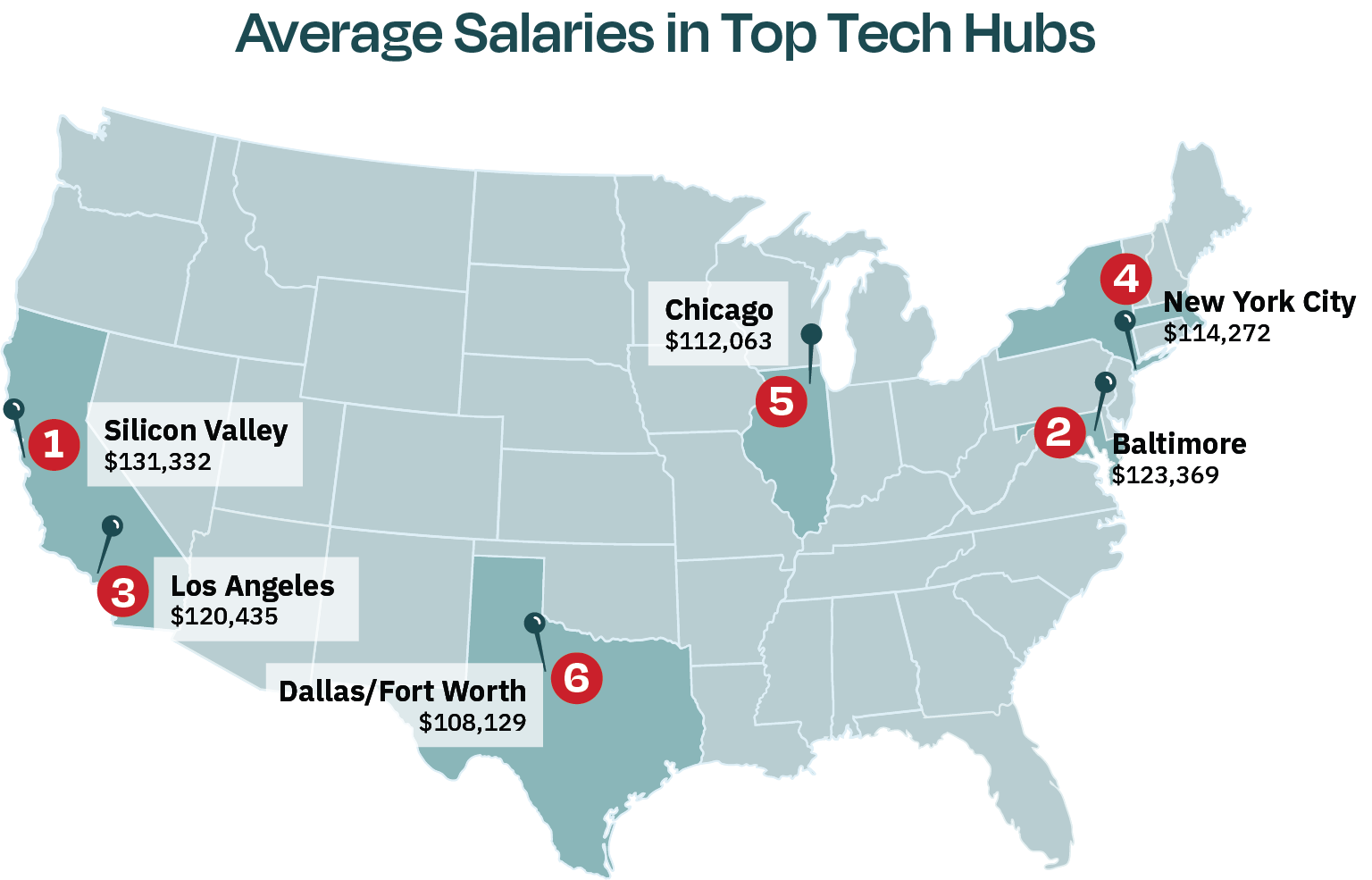Salary Trends
Salary Trends
Overview
The average technology professional now earns $112,521—a modest 1.2% year over year increase.
This growth is an encouraging indication of the continued resilience of tech despite high-profile layoffs and economic uncertainty. However, as HR leaders build their tech hiring strategies in 2025, it is important to remember that beneath this headline figure lies a complex story, with sharp variations in compensation across regions, sectors, and experience levels.
Understanding these shifts is essential for a talent acquisition strategy that leads to strong and loyal tech teams. For example, we’ve noted tech pros’ unprecedented dissatisfaction with their current compensation, which could have a huge impact on how companies attract and retain their best talent. In this chapter, we cover the nuances behind these salary trends, using detailed survey data to analyze the key factors influencing tech compensation across sectors and roles, and identify where the brightest spots of growth lie within the tech hiring marketplace.
2024 Average Tech Salary
Growth Since 2023
Prefer to learn in audio?
Click the video to listen to the narrated version of this chapter.
Location Matters: Where Tech Salaries Grew (and Fell)
Tech compensation shows striking regional contrasts in 2024, as well as some interesting variations from the previous year. New York has emerged as the highest-paying state for tech talent, while Florida demonstrated remarkable momentum with 12.1% year-over-year growth—the only state to achieve double-digit salary increases. Florida has worked hard to attract tech professionals and investment from across the country, which could help power this demand; meanwhile, New York remains a preeminent tech hub.
However, not all states saw positive movement. For example, average New Jersey salaries saw the most significant decline at 13.9%, while Virginia, Illinois, and North Carolina saw declines as well.
Looking at trends across regions, the South experienced the most salary growth at 4.4%, while both the Midwest and Northeast saw modest declines (-1.6% and -2.1% respectively). Tech professionals in the Midwest make significantly less than those in other regions, at $104,736 on average, but they may enjoy a cost-of-living advantage over other regions, particularly the coasts.
Silicon Valley maintained its tech salary dominance over other cities in 2024, even though it saw a 7.3% decline from last year. The Baltimore/Washington D.C. area saw the most growth at 5.8%, with Dallas/Fort Worth and Los Angeles gaining as well. Whatever the market's fluctuations, these metro areas have similar advantages: a variety of large tech companies and feisty startups, deep talent pools and access to capital, and infrastructure to support work and play.
Tech Salary Change by State
Change Since 2023
Average Tech Salary by State — Top 10

Average Tech Salaries by Region
Average Tech Salary by City
Industry Salary Trends Surface Clear Winners
Manufacturing surfaced in this year’s data as a standout sector for tech compensation growth, showing an impressive 15.1% salary increase. This is not surprising considering the industry’s need for automation, computer vision, and other cutting-edge technologies as part of a broader digital transformation. Meanwhile, traditionally strong sectors for tech salaries—consulting, software, and banking/finance—held their ground, with average salaries exceeding $125,000, significantly higher than the overall average.
The education sector faced the most significant decline, with a 10.9% loss in average compensation. We may be seeing a correction after rampant hiring in education tech during the pandemic; budget cuts among education companies during a tumultuous economy could also be responsible.
Top Tech Salaries by Industry

Change in Tech Salaries by Industry
Change Since 2023
Tech Companies Continue to Deliver Higher Salaries
Even in a year marked by high-profile layoffs, tech companies haven't lost their edge when it comes to compensation for tech professionals: those working at tech companies earn 5.7% more than their peers in other industries, and this gap is growing—tech companies increased salaries by 2.2% in 2024 even as other sectors saw a decline.
A look at our survey demographics is also revealing tech companies attract the highest percentage of professionals aged 25-34, while those over 45 are more likely to work in non-tech industries. This shift may reflect both voluntary and involuntary factors. Tech professionals older than 45 were the most affected by 2024's industry layoffs, which occurred more frequently in tech than other sectors. Some of these experienced workers may also be choosing roles outside tech to prioritize work-life balance overcompensation.
Tech professionals should keep in mind that there is plenty of opportunity outside of the tech industry, especially for those willing to accept lower compensation. No matter what your career goals, it is also critical to remember that you can negotiate for more than salary; for example, a company that is unable to pay you a premium for your work might be more than happy to discuss additional benefits or a better schedule.
Average Salaries for Tech Professionals Inside the Tech Industry*
year over year
Average Salaries for Tech Professionals Outside the Tech Industry*
year over year
*For the purposes of this survey, we defined a technology company as one that includes digital electronics, software, internet-related services and e-commerce services.

Shifting Salary Patterns within Career Stages and Roles
Mid-career professionals were the clear winners in this year's salary adjustments based on experience. Those with 3-5 years of experience saw a nearly six percent salary increase, marking a significant reversal from last year's eight percent decline. This rebound suggests employers are investing more heavily in retaining professionals who have proven their capabilities but haven't yet reached peak compensation levels.
Tech professionals with more than 15 years of experience continued their upward trajectory, though barely. This group experienced a modest 0.5% increase, maintaining their position as the highest-compensated cohort with average salaries of $133,047. The slower growth rate may reflect that many of these professionals have already reached senior compensation bands within their organizations.
Last year proved most challenging for those early in their careers. Entry-level tech professionals (2 years or less) experienced a second consecutive year of salary declines, with a 1.4% decrease. This continued downward pressure on entry-level compensation likely reflects both market conditions and the increasing supply of early-career talent.
Average Tech Salary by Experience
Support Roles Experience Salary Slip
Of the nine roles we analyzed for year-over-year trends, only two saw notable salary declines: Systems Administrators and Help Desk Technicians. The decline in help desk technician salaries is especially interesting, as the role experienced a nearly 5 percent increase in last year’s salary survey. Perhaps we are seeing the impact of AI driving change in the workplace, as more companies use AI tools to automate many aspects of the help desk; alternatively, a younger and tech-savvy workforce could be slackening demand for help-desk assistance.
Tech Salaries by Occupation
Change in Tech Salaries by Occupation
Change Since 2023
Fastest Growing Tech Salaries by Skill
Growth Since 2023
Certifications: From Nice-to-Have to Career Accelerator
The relationship between technical certifications and higher compensation continues to show compelling patterns in 2024. While nearly half of tech professionals currently hold technical certifications, a ratio consistent with previous years, there are signs that more could pursue vital certs in the next few years. For instance, this year we saw a decrease in professionals who view certifications as unnecessary, as well as an uptick in those actively pursuing new credentials. This changing perspective appears well-founded: certified tech professionals enjoy, on average, $2,000 higher salaries per year.
Certification patterns across career tenure show us that the value of certifications multiplies over time. Among tech professionals with over 20 years of experience, the salary differential between certified and non-certified individuals becomes particularly pronounced at over $6,000 per year.
Average Tech Salary for Those With Certifications
Average Tech Salary for Those Without Certifications
Average Tech Salary for Those With Certifications, by Years of Experience
Current Certification Landscape
ech professionals most commonly hold CompTIA A+ and AWS certifications, reflecting market demand for both foundational IT skills and cloud computing expertise. While seasoned professionals (i.e., those with over 10 years of experience) are more likely to hold Microsoft credentials such as Microsoft Certified Professional (MCP), Microsoft Certified Solutions Associate (MCSA), and Microsoft Certified Solutions Expert (MCSE), younger tech professionals seem less interested in pursuing them. This could indicate an industry shift away from Microsoft-specific skills toward more platform-agnostic abilities. In general, however, more early-career professionals are currently pursuing certifications, suggesting growing recognition of their value in a tough job market.
Not every tech specialty necessarily requires certifications. However, certifications can help tech professionals stand out to hiring managers and recruiters during the hiring process. Those professionals worried about the time and expense necessary to earn certifications should consider asking their current employer to foot the bill; many organizations are only too happy to pay for tech training and certifications, because they know that leads to higher satisfaction (and retention) rates among employees.
Possession of Technical Certifications by Years of Experience
Career Opportunities for 2025
Invest in AI Talent Development
AI and machine learning skills are in high demand and command significant salary premiums. Invest in your own development by taking AI-centric online courses, attending workshops, or pursuing certifications. This will not only make you more valuable to your current employer but also open doors to new opportunities.
Address Regional Compensation Disparities
While tech hubs like Silicon Valley and New York offer higher salaries, there are opportunities for competitive compensation in other regions. If you live in an area with a lower cost of living, consider remote-work options that can allow you to access higher compensation tiers.
Leverage Certifications to Boost Your Career
Certifications validate your skills and expertise, making you more attractive to employers. Invest time and effort in obtaining relevant certifications, as they can significantly impact your earning potential and career advancement.
Protect Your Value as an Experienced Professional
As an experienced tech professional, you possess a wealth of knowledge and skills. To maintain your value in the job market, focus on continuous learning, adapt to emerging technologies, and build strong professional relationships. Consider flexible work arrangements and other benefits that can improve your work-life balance.
Early-Career Professionals: Build a Strong Foundation
Early in your career, focus on building a solid foundation of technical and soft skills. Seek out mentorship opportunities, participate in open-source projects, and actively contribute to your team. By consistently demonstrating your value, you can position yourself for rapid career growth.
